Module 1 Section Ⅲ Grammar——将来进行时与一般将来时
必修四 module1 将来进行时
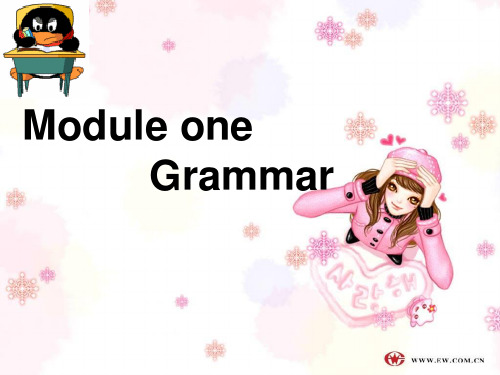
• Look—it's going to rain! • a future which you can "see" now • be going to+动词原形, 表示根据已有的 迹象推测很可能要发生的事情。
• We arrive in Beijing on Tuesday at eight in the evening. • a timetable • 一般现在时可以表示按计划或时刻表要发 生的事(此用法只限于某些瞬间动词,如: arrive, begin, come, finish, get, go, leave, meet, return, sail, spend, start等)
Writing – Activity 1- 3
• What different ways of talking about the future can you find?
Complete the sentences with an appropriate tense. will be having 1. I ____________(have) my lesson in our classroom at 9 tomorrow morning. 2. -Would you like to go to our school to study next year? am going to study -I _______________(study) in Australia next year. 3. - I thought I had asked you to post the letter. will do (do) it right now. - Oh, I’m sorry. I ________
外研版英语九年级上册Module1语法点6种时态的区分
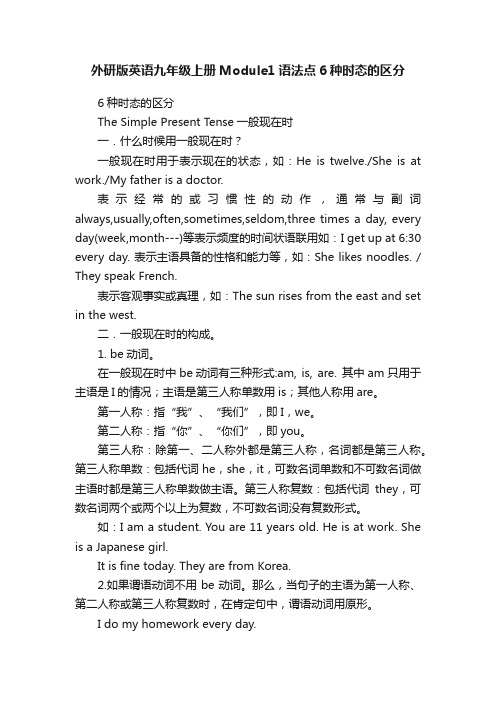
外研版英语九年级上册Module1语法点6种时态的区分6种时态的区分The Simple Present Tense一般现在时一.什么时候用一般现在时?一般现在时用于表示现在的状态,如:He is twelve./She is at work./My father is a doctor.表示经常的或习惯性的动作,通常与副词always,usually,often,sometimes,seldom,three times a day, every day(week,month---)等表示频度的时间状语联用如:I get up at 6:30 every day. 表示主语具备的性格和能力等,如:She likes noodles. / They speak French.表示客观事实或真理,如:The sun rises from the east and set in the west.二.一般现在时的构成。
1. be动词。
在一般现在时中be动词有三种形式:am, is, are. 其中am只用于主语是I的情况;主语是第三人称单数用is;其他人称用are。
第一人称:指“我”、“我们”,即I,we。
第二人称:指“你”、“你们”,即you。
第三人称:除第一、二人称外都是第三人称,名词都是第三人称。
第三人称单数:包括代词he,she,it,可数名词单数和不可数名词做主语时都是第三人称单数做主语。
第三人称复数:包括代词they,可数名词两个或两个以上为复数,不可数名词没有复数形式。
如:I am a student. You are 11 years old. He is at work. She is a Japanese girl.It is fine today. They are from Korea.2.如果谓语动词不用be动词。
那么,当句子的主语为第一人称、第二人称或第三人称复数时,在肯定句中,谓语动词用原形。
2019Module 1 Section Ⅲ Grammar——将来进行时与一般将来时教育精品.ppt
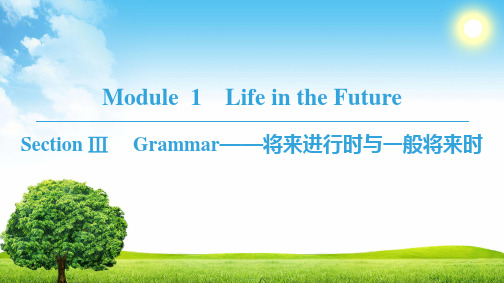
语 法 精 要 点 拨
连用。 What will you be doing at eight o'clock this evening?今天晚上 8 点你将在 干什么? At this time tomorrow I shall be flying to London. 明天这个时候我将在飞往伦敦的途中。
返 首 页
Ⅱ.单句改错
语 境 自 主 领 悟
1.I will having my lessons in our classroom at 9 tomorrow morning. will 后加 be 2. When we graduates from the university this summer, we have studied here for four years.
返 首 页
谢谢观看
语 法 应 用 落 实
语 法 精 要 点 拨
When he comes,I will give him some advice. 当他来时,我会给他一些建议。 Fish will die without water. 鱼没有水就会死。
返 首 页
语 境 自 主 领 悟
[即时训练 2] 单句语法填空 ①She will be (be) twentyfour years old next year.
返 首 页
语 境 自 主 领 悟
Байду номын сангаас
(2)表示对将来的情况或结果的预测,不表示动作正在进行。 If we keep working hard like this,we will be making a miracle.如果我们继 续这样努力工作的话,我们会创造奇迹的。 (3)表示按计划或安排将要发生的动作,此时不带感情色彩,有时表委婉
高中英语:Unit 1 Section Ⅲ Grammar——直接引语变间接引语
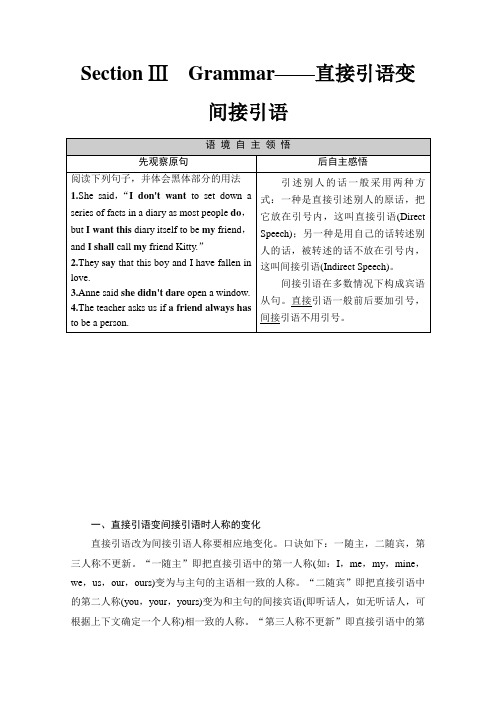
Section ⅢGrammar——直接引语变间接引语一、直接引语变间接引语时人称的变化直接引语改为间接引语人称要相应地变化。
口诀如下:一随主,二随宾,第三人称不更新。
“一随主”即把直接引语中的第一人称(如:I,me,my,mine,we,us,our,ours)变为与主句的主语相一致的人称。
“二随宾”即把直接引语中的第二人称(you,your,yours)变为和主句的间接宾语(即听话人,如无听话人,可根据上下文确定一个人称)相一致的人称。
“第三人称不更新”即直接引语中的第三人称(he,him,his,she,hers,it,its,they,their,theirs,them)变为间接引语时,人称不变。
一随主:He said,“I like it very much.”→He said that he liked it very much.(I改为he,it不变)二随宾:He said,“You told me this story.”→He said that I had told him that story.(You改为I,me改为him,told改为had told)第三人称不更新:He said to me,“She's left her book in your room.”→He told me that she had left her book in my room.(She's改为she had,her不变,your改为my)[即时演练1]句型转换①The workers said,“The leaders often make the workers work extra hours.”→The workers said that the leaders often made the workers work extra hours.②Mary said,“I want to have a computer of my own.”→Mary said that she wanted to have a computer of her own.③Her colleague said to her,“Who did you ask for a leave?”→Her colleague asked her who she had asked for a leave.二、直接引语变间接引语时时态的变化1.主句的谓语动词是一般过去时。
Module 1 Section Ⅲ Grammar &Writing
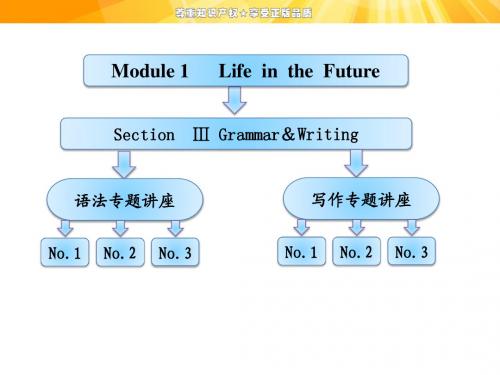
返回
第三步:连句成篇
Our future life Sometimes I dream about what life in the future will be like.Perhaps some people will have the alternative to go to the moon for a holiday or live under the sea. Maybe we will have videophones in every home through which we can have a medical examination. Besides, doctors can do
③I am curious about future life. ④It is fascinating to image life in the future. 2.表达预测的常用句式: ①Maybe in the future we can ... ②There is a possibility that human beings will ... ③Perhaps some people will ... ④We will be living ... in the future. 返回
②Don‘t waste your time like that. I’m afraid you are
regretting one day. are regretting→will be regretting 返回
4.用于疑问句也表示客气地询问别人的打算。 When shall we be meeting again? 我们什么时候再见面?
请问,你什么时候把借的钱还给我啊?
返回
3.be going to do表示计划、打算和安排要发生或有种种
Grammar 一般将来时in module 1

The future simple tense
Will / be going to 表示将来的动作
Will与be going to 是一般将来时的两个基本结构,它们用来 表示将来发生的动作或状态。在使用时一定要注意两者之间 的区别: 使用will的情况: 1.单纯地表示将来,没有主观因素。 He will be home at six it will become warm when spring comes.
Ⅱ.用will或be going to填空 1.It ____________ become warm when spring comes. 答案:will 2.Watch out!We ____________ crash! 答案:are going to 3.She has thought it over.She ____________see Mr.Wang this afternoon. 答案:is going to
来时。
8.They ________ to work in Tibet for two years.
A.are going to be sent B.are going to send C.will send D.sent 解析:选A。表计划,打算将要做某事,they与send之间是被动关系。 9.—Your job ________ open for your return. —Thanks. A.will be kept B.will keep C.had kept D.had been kept 解析:选A。表允诺,job与keep之间是被动关系。
be going to + do 的用法: 1.用来表示按计划,安排在最近的将来要发生的动作。有“准 备,打算”之意,这种主观意图,一般已做过事先的安排, 故其实现的可能性较大。 The film is going to be put on next week. We are going to have a class meeting this afternoon. 2.表示根据现有情况,某种迹象,判断将要或者即将发生的动 作。此时不含主观意图,只是表示说话人对客观事态发展的
外研版高中英语book4module1grammar将来进行时教学课件

At this time tomorrow ____B_ for New York. A. we’re going to fly B. we’ll be flying C. we’ll fly D. we’re to fly
四. 一般将来时的表达方式比较
(1)will/shall do 表示在将来某个时间要发生的动作或存在的状 态,常与表示将来的时间状语连用;will do也可指临 时决定做某事。
Will turn
off等)
EXERCISES
1. ---can I call you back at two o’clock this afternoon?
---I am sorry, but by then I _____W__i_ll_b(fely)fltyoinBgeijing.
How about five?
until tomorrow morning.
D
Jane can’t attend the meeting at 3 o’clock this afternoon because she _______ a class at that time.
A. will teach B. would teach C. has taught D. will be teaching
They/he/she/it will be working
二、将来进行时的用法
(1)表示将来某一时刻或某段时间正在进行的动 作,常与at this time tomorrow,at 4 o'clock tomorrow afternoon,this time next week等时间状语连用。
A
---guess what? We’ve got our visas for a shortterm visit to the UK this summer.
Book 1 Module 1 模块语法
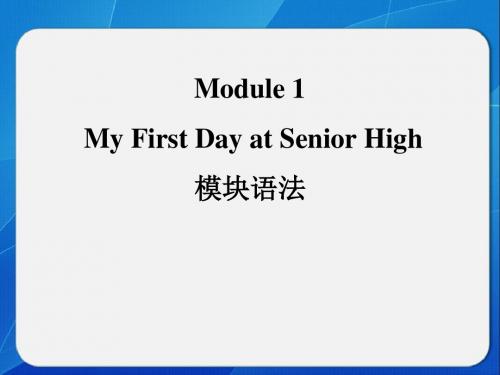
shall/ 将来 will play 过去 将来 would play
will have will have played been playing would would have have been played playing
一般现在时 & 现在进行时 观察下列从Reading and Vocabulary中选 取的句子,体会一般现在时和现在进行时 以及v.ing形式的形容词和v.ed形式的形 容词的用法。
2.表示现阶段正在进行而此刻不一定进 行的动作。 这一学期你的物理学习怎么样? How are you getting on with your physics this term?
3.表示按计划、安排将要发生的动作。 有此用法的动词还有go,come,leave, start,arrive,return等。 几天后,怀特先生将动身去北京。 is leaving for Beijing in a Mr.White ___________ few days.
8.I don't want to buy a new house am saving because I__________(save)money for my son,who is going to have further study abroad. do 9.I ________(do)all the cooking for my family;but recently I have been too busy to do it. 10.—Dad,can you bring me my kite? am repairing (repair) —Sorry,son. I ____________ your bike.
21-22版:Grammar——将来进行时的用法(创新设计)

Grammar——将来进行时的用法
1
@《创新设计》
2
@《创新设计》
1.However,in the not-too-distant future,we will be living in smart homes that will lock the door for us when we are away and remember to switch off the TV when we forget.
13
@《创新设计》
⑤—What are you doing,Jack? —Make a model plane.I ___w_i_ll_b_e__s_h_o_w_i_n_g____ (show) it in the science class at 10 o’clock tomorrow morning. ⑥More expressways _______w_i_ll_b_e__b_u_il_t________ in Sichuan soon to promote the local economy. 四川将很快建设更多的高速公路以促进当地的经济。 ⑦I bet Jack ____w_i_ll_s_t_il_l_b_e_s_l_ee_p_i_n_g_____ when we get home. 我敢打赌我们到家时Jack还在睡觉。
4
@《创新设计》
一、构成 将来进行时由“will/shall be+动词-ing形式”构成。will be用于各类人称,shall be 用于第一人称。 I shall be coming to see you next week. 我下周将来看你。 I will be studying in the new teaching building to be completed next month. 下个月我将在这个即将竣工的新教学楼里学习。
部编版八年级英语上册《Grammar》教案及教学反思
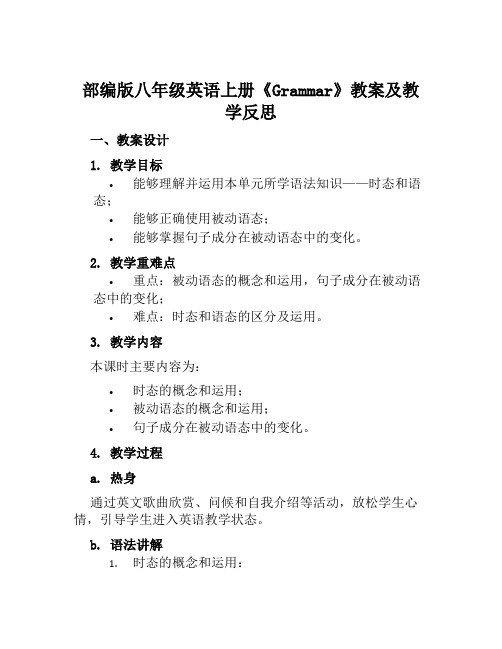
部编版八年级英语上册《Grammar》教案及教学反思一、教案设计1. 教学目标•能够理解并运用本单元所学语法知识——时态和语态;•能够正确使用被动语态;•能够掌握句子成分在被动语态中的变化。
2. 教学重难点•重点:被动语态的概念和运用,句子成分在被动语态中的变化;•难点:时态和语态的区分及运用。
3. 教学内容本课时主要内容为:•时态的概念和运用;•被动语态的概念和运用;•句子成分在被动语态中的变化。
4. 教学过程a. 热身通过英文歌曲欣赏、问候和自我介绍等活动,放松学生心情,引导学生进入英语教学状态。
b. 语法讲解1.时态的概念和运用:时态是指动作或状态发生的时间,在句子中主要通过谓语动词的形式来表示。
英语总共有12种时态,分别为:•一般现在时:常表示习惯性动作和客观真理等;•现在进行时:表示正在进行的动作或状态,常与现在时间状语连用;•一般过去时:表示已经结束的过去动作或状态;•过去进行时:表示过去某个时刻正在进行的动作或状态;•现在完成时:表示已经完成的动作对现在造成的影响,常与for、since等状语连用;•过去完成时:表示在过去某个时间之前已经完成的动作;•将来进行时:表示将来某个时间正在进行的动作;•一般将来时:表示将来的动作;•将来完成时:表示将来某个时间之前已经完成的动作;•完成进行时:表示从过去一直延续到现在正在进行着的动作;•过去完成进行时:表示从过去某个时间一直延续到另一个过去时间正在进行着的动作;•虚拟语气:表示不是事实的情况,有三种形式——虚拟现在时、虚拟过去时、与过去相反的虚拟过去时。
2.被动语态的概念和运用:被动语态表示动作的承受者,主要形式为be动词+过去分词。
其一般用法为:•主语+be+过去分词;•主语+be+过去分词+by+动作执行者。
3.句子成分在被动语态中的变化:句子成分在被动语态中的变化主要表现在:1. 主语变成被动语态的动作承受者;2. 宾语变成被动语态的主语;3. 动词变成被动语态形式。
外研八年级上册Module 1 Grammar重点语法一般现在时,一般过去时,一般将来时与现在进行时

班级姓名学号分数Module 1 How to learn English一般现在时,一般过去时,一般将来时与现在进行时(时间:60分钟,满分:100分)一、单项选择(本大题共40小题,每小题1.5分,共60分)1.The kangaroo ________ from ________.A.come; Australia B.comes; AustraliaC.comes; Australian D.come; Australian2.—Do you have an art lesson today?—Yes. And it _________ at 12:00. Then we can have lunch.A.finish B.finishing C.to finish D.finishes 3.— Does your father like hamburgers for dinner?— No, he _________. He always eats healthy food.A.is B.does C.isn’t D.doesn’t 4.Everyone in my class ________ sports.A.enjoy B.is like C.like D.enjoys5.Turn off the tap. The pot ________ water.A.was full of B.is full of C.was filled with D.is filled of 6.My dog likes________, but it never _______ me.A.to bark; bark at B.barking; barkC.barking; barks at D.barking at; barks7.Listen! ________ you ________ someone screaming?A.Are; hear B.Are; hearing C.Did; hear D.Do; hear 8.Jim would like ________ a doctor when he ________ up.A.to be; grows B.be; will growC.being; grows D.to be; will grow9.Sandy, please tell me what ________ you. Maybe I can help you.A.worrying B.worriesC.worries about D.worried about10.My school is a little far from my home. It often ________ me half an hour ________ there.11.—I hear Jackie Chan will come to Wuxi next week.—Really? ________ he ________, my sister will be very happy.A.If; comes B.If; will come C.Before; come D.Till; comes 12.—Jim, you ________ late again!—Sorry, I ________ next time.A.are; don’t B.will be; won’t C.are; won’t D.will be; don’t 13.Tom ______ to go far if he _______ some help. Our house is next to his. A.doesn’t need; need B.needn’t; needs C.doesn’t need; needs D.needn’t; need 14.The teachers in our school each ________ a computer now.A.are having B.have C.is having D.has 15.—Here comes the bus! Where is our principal?—She can’t go to the museum with us. She ________ some visitors around our school. A.is showing B.shows C.has showed D.was showing 16.—Listen, our teachers _________ Red Songs in the next room.—Yes. Let’s go and have a look.A.sing B.sings C.sang D.are singing 17.—Lucy, can you help me cook dinner?—Oh, sorry, Mom. I __________ my clothes.A.am washing B.wash C.washed D.to wash 18.Look, the children ________ the flowers in the garden.A.are watering B.water C.watered D.will water 19.—Excuse me, where is Miss Smith?—She ________ on the phone outside the office now.A.talks B.talked C.is talking D.was talking 20.—Tom, I need your help!—Oh, sorry, Mr. Li. I _______ the classroom.A.clean B.am cleaning C.cleans D.to clean 21.—Listen! Who ________ in the next room?—I don’t know.A.sing B.sings C.singing D.is singing 22.—May I speak to Mr. Brown?A.take B.takes C.is taking D.are taking23.The Whites ________ TV now.A.are watching B.watches C.watching D.is watching24.—Where are you going, Tom?—To play football. Mike ________ for me at the school gate at present.A.waits B.waited C.is waiting D.will wait25.—Keep quiet, kids. Dad ________ in the next room.—OK, Mum.A.sleep B.sleeps C.has slept D.is sleeping26.—What did they do last weekend?—They ________ in the park.A.went a boat B.went to a boat C.went boating D.took boating27.—________ he ________ to school?—Yes, he did. He was late.A.Does; hurry B.Did; hurry C.Was; hurried D.Were; hurry28.I ________ but ________ nothing.A.was listened; was hearing B.listened; heard C.listen;heard D.heard; listened to 29.When I passed the music room, I ________ some students ________ a beautiful song.A.hear; are singing B.hear; singing C.heard; singing D.heard; are singing30.—________ you born in Cambridge?—No. I ________ born in Canada.A.Was, were B.Were, was C.Are, am D.Were, wasn’t31.—Excuse me, don’t you see the sign “No smoking” on the wall?—Sorry, I ________ it.A.don’t see B.didn’t see C.don’t look at D.didn’t look at32.________ a concert next Saturday?A.Will there have B.Will there be C.Is there going to have D.Is there having 33.—Where is the morning paper?—I ________ it for you at once.A.get B.am getting C.to get D.will get34.He _______ very busy today. He _______ free next week.35.—Will there be a concert in People’s Theatre next week?— ________. Let’s go together.A.Yes, there is B.No, there isn’t C.Yes, there will D.No, there won’t 36.—________ a tall teaching building in our school in the future?—I am not sure.A.Will there be B.Will there is C.Will there have D.Will there has 37.There’s going to ________ in tomorrow’s newspaper.A.have something interesting B.have interesting somethingC.be something interesting D.be interesting something38.They will ________ finish the work tomorrow.A.can B.could C.be able to D.are able to 39.There ________ a football match this evening.A.is going to have B.will have C.is going to be D.will be have 40.They ________ to the museum three days ago. They ________ there again tomorrow. A.will go; went B.go; will go C.went; will go D.went; went 二、用所给单词的正确形式填空(本大题共40小题,每小题1分,共40分)41.I think he ________ (become) a good basketball player in ten years.42.Michael __________ (teach) in a school in Yunnan from February to June next year. 43.—Are you going ________(see) your brother?—Yes, I am.44.We ________ at the school gate at eight o’clock tomorrow.(meet)45.There ________ (be) a sports meeting tomorrow morning in our school.46.We _____ (camp) by the lake. It was quite good.47.I ________ (wake) up suddenly because of a nightmare (恶梦) last night.48.Last weekend, our parents ______(take) us to China to visit the Great Wall.49.They said “hello” to each other and then _____(sit) down.50.The children ______(fly) kites in the park happily yesterday afternoon.51.They ______(forget) to do their homework last weekend.52.—Who ________ (pay) for you to go to France?—My parents did.53.The man jumped off his bike and ________ (hide) himself behind the bushes quickly.55.Yesterday he saw me and ________(nod) to me in front of the library. 56.Yesterday I stayed at home and ________(read) Alice in Wonderland.57.Your English sounds great. Who ________ (teach) you? Did you learn it by yourself? 58.This city ________ (build) a new library for the blind now.59.It’s 10:30 a.m. Susan and her sister are still ________(sleep).60.Peter is ________ (print) the documents at the moment.61.There is a cat _________ (lie) in the basket.62.Look! They ________ (dig) a hole.63.— Excuse me, can I talk with your manager now?— I’m afraid not. He ________ (speak) at an important meeting.64.Look! The dog is ________ (cross) the street to run after the cat.65.—Where is Sandy?—Oh, She _________ (practise) basketball with other team members.66.I can’t go out with you. I _________ (wash) my clothes now.67.The twins ________ (do) their homework in their bedroom at the moment.68.I will take a photo of you when you are ________ (dance).69.Be quiet! The little boy ________ (sleep) now.70.I often ________ (buy) gifts for my parents on their birthdays.71.________ he ________ (clean) the windows once a week?72.My lovely pet never ________ (worry) because we take good care of her. 73.— How about playing basketball?— ________(sound) great.74.My favorite subjects ________(be) science and music.75.—Who ________ (cook) meals in your family?—My mother.76.She is very famous and she often ________ (appear) on TV.77.The father usually ________ (fly) a kite with his son in spring every year.78.V atersay hasn’t got a school, but she ________ (teach) herself at home. 79.“Where is my schoolbag?” Tom always ________ (ask) his mother.80.There ________ (be) a pen and three books on my desk.参考答案:1.B【解析】句意:这只袋鼠来自澳大利亚。
外研版八年级英语上册模块M1-一般现在时、现在进行时、一般将来时、一般过去时知识点总结—+练习
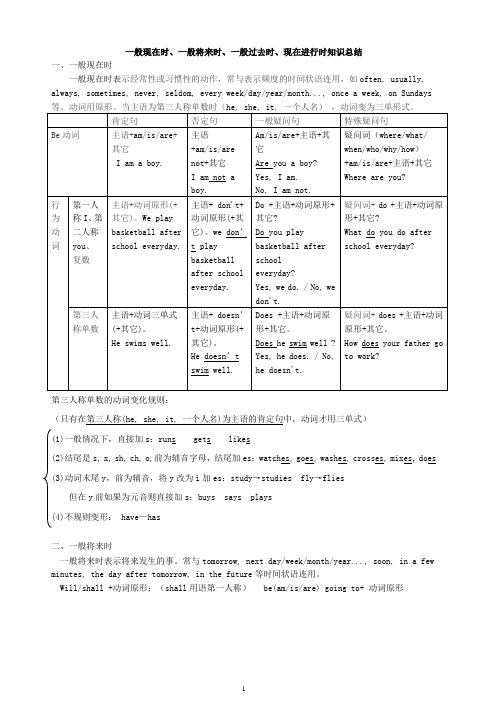
一般现在时、一般将来时、一般过去时、现在进行时知识总结一、一般现在时一般现在时表示经常性或习惯性的动作,常与表示频度的时间状语连用,如often, usually, always, sometimes, never, seldom, every week/day/year/month..., once a week, on Sundays第三人称单数的动词变化规则:(只有在第三人称(he, she, it, 一个人名)为主语的肯定句中,动词才用三单式)(1)一般情况下,直接加s:runs gets likes(2)结尾是s, x, sh, ch, o,前为辅音字母,结尾加es:watches, goes, washes, crosses, mixes, does(3)动词末尾y,前为辅音,将y改为i加es:study→studies fly→flies但在y前如果为元音则直接加s:buys says plays(4)不规则变形: have—has二、一般将来时一般将来时表示将来发生的事。
常与tomorrow, next day/week/month/year..., soon, in a few minutes, the day after tomorrow, in the future等时间状语连用。
Will/shall +动词原形;(shall用语第一人称) be(am/is/are) going to+ 动词原形三、一般过去时一般过去时表示过去某一时候或某一段时间所发生了的事情或存在的状态。
常与过去时间yesterday ,ago, this morning ,just now ,a moment ago ,last night / year / week/month ,once upon a time ,the other day,before ,the day before yesterday, in 1989, at the age of five, one day, then(那时), on that day, in the past 连用。
外研版八年级英语上册模块M1-一般现在时、现在进行时、一般将来时、一般过去时知识点总结—+练习

一般现在时、一般将来时、一般过去时、现在进行时知识总结一、一般现在时一般现在时表示经常性或习惯性的动作,常与表示频度的时间状语连用,如often, usually, always, sometimes, never, seldom, every week/day/year/month..., once a week, on Sundays第三人称单数的动词变化规则:(只有在第三人称(he, she, it, 一个人名)为主语的肯定句中,动词才用三单式)(1)一般情况下,直接加s:runs gets likes(2)结尾是s, x, sh, ch, o,前为辅音字母,结尾加es:watches, goes, washes, crosses, mixes, does(3)动词末尾y,前为辅音,将y改为i加es:study→studies fly→flies但在y前如果为元音则直接加s:buys says plays(4)不规则变形: have—has二、一般将来时一般将来时表示将来发生的事。
常与tomorrow, next day/week/month/year..., soon, in a few minutes, the day after tomorrow, in the future等时间状语连用。
Will/shall +动词原形;(shall用语第一人称) be(am/is/are) going to+ 动词原形三、一般过去时一般过去时表示过去某一时候或某一段时间所发生了的事情或存在的状态。
常与过去时间yesterday ,ago, this morning ,just now ,a moment ago ,last night / year / week/month ,once upon a time ,the other day,before ,the day before yesterday, in 1989, at the age of five, one day, then(那时), on that day, in the past 连用。
module1 grammar将来进行时

Translation
❖明年这个时候,我将会在上海游 玩。
❖This time next year, I will be visiting shanghai.
❖明天5点半,我们将会在吃晚饭。
❖At 5:30 tomorrow, we shall be having supper.
❖今天晚上8点,我将会在洗衣服。
2. I ____ in the sun on the beach today next week. A. will bathe B. am bathing C. will be bathing D. bathe
3. What do you think the children ___ when we get home? A. will be doing B. will do C. are doing D. are going to do
The future continuous (将来进行时) 表示将来某一时间内正在进行的动作。 构成:“shall/ will be doing” Shall可以用 于第一人称I, we ;
常见的时间状语
❖ 将来的一个具体时间 ❖ 例如: ❖ At this time tomorrow/ next year ❖ At 6 o'clock this /evening
高考考点透视
1. At this time tomorrow _____ for New York. A. we’re going to fly B. we’ll be flying C. we’ll fly D. we’re to fly
2. Why don’t you put the meat in the fridge? It will _____ fresh for several days. A. be stayed B. stay C. be staying D. have stayed
18 19Module1SectionⅢGrammar名词用作动词andwill和begoingto表将来
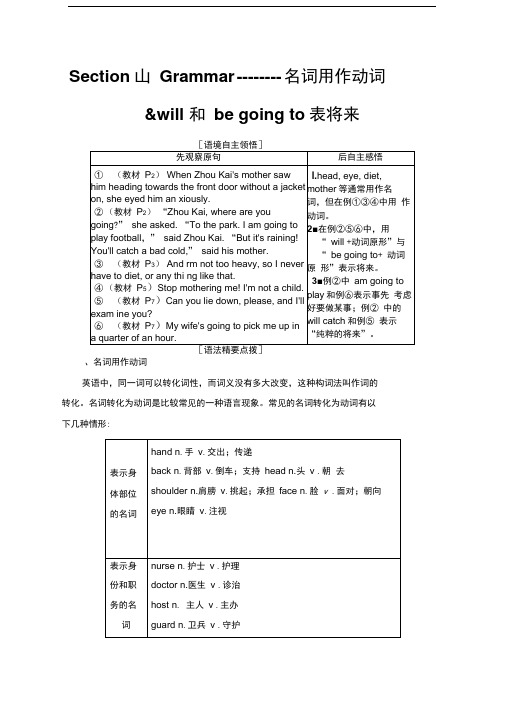
Section山Grammar -------- 名词用作动词&will 和be going to表将来[语境自主领悟][语法精要点拨]、名词用作动词英语中,同一词可以转化词性,而词义没有多大改变,这种构词法叫作词的转化。
名词转化为动词是比较常见的一种语言现象。
常见的名词转化为动词有以下几种情形:We should face all kinds of difficulties bravely.我们应该勇敢面对各种困难。
She nursed her daughter back to health.她精心照料女儿恢复健康。
Tokyo will host the 2020 Olympic Games.东京将主办2020年奥运会。
These trees n eed to b watered这些树需要浇水。
He voiced his dissatisfaction by turning away his head. 他把头转向一边,表示出了他的不满情绪。
[即时演练1]完成句子①No one nosed (no se)the dan ger before the earthquake occurred.②It was rainin g(rai n)heavily whe n we arrived there.【导学号:68712019】③Whe n the famous star came in, all people eyed(eye)her.二、will 和be going to 表将来1. will +动词原形(1) 表示纯粹的将来,没有主观因素。
It will become warm whe n spri ng comes.春天来了,天气将会变暖。
(2) 表示一种倾向性或习惯性的动作。
Each time he comes to Beijing, he will visit the Great Wall.每次来到北京,他都要游览长城。
Module 1 Life in the Future Grammar—将来进行时课件

我明天八点钟正在上英语课。
将来进行时的基本用法
▶(2)表示已经安排好要发生的动作。 例1:This time tomorrow I shall be flying to New York.
04 现在进行时表将来进行时
现在进行时表将来进行时
▶在时间、条件等状语从句中,用现在进行时代替将来进行时。 例1:Be careful when you are crossing the street. 过马路时要当心。 例2:If Tom is doing his homework when you come back,
你将要去参观国家公园来近距离地观看野生动物吗?
03 将来进行时与一般将来时的区别
将来进行时与一般将来时的区别
▶(1)一般将来时表示将来某一时间将要发生的动作;将来进行时通常 表示将来某个时刻或某一段时间正在进行的动作。 例1:When he comes back from Australia, I will give him some advice.
▶(3)一般疑问句:Shall/Will+主语+be doing? 例:Will you be drawing up the schedule for the new year this time tomorrow?
明天这个时候你将在制订新一年的计划吗? ▶(4)特殊疑问句:疑问词+shall/will+主语+be doing? 例:What will you be doing at eight tomorrow morning in the science lab?
- 1、下载文档前请自行甄别文档内容的完整性,平台不提供额外的编辑、内容补充、找答案等附加服务。
- 2、"仅部分预览"的文档,不可在线预览部分如存在完整性等问题,可反馈申请退款(可完整预览的文档不适用该条件!)。
- 3、如文档侵犯您的权益,请联系客服反馈,我们会尽快为您处理(人工客服工作时间:9:00-18:30)。
Section ⅢGrammar——将来进行时与
一般将来时
[语境自主领悟]
1.将来进行时的用法
(1)表示将来某一时刻或某段时间正在进行的动作,常与at this time tomorrow,at 4 o'clock tomorrow afternoon,at this time next week等时间状语连用。
What will you be doing at eight o'clock this evening?今天晚上8点你将在干什么?
At this time tomorrow I shall be flying to London.
明天这个时候我将在飞往伦敦的途中。
(2)表示对将来的情况或结果的预测,不表示动作正在进行。
If we keep working hard like this,we will be making a miracle.如果我们继续这样努力工作的话,我们会创造奇迹的。
(3)表示按计划或安排将要发生的动作,此时不带感情色彩,有时表委婉的语气。
Tomorrow is my day on duty,so I shan't be coming home.明天我要值班,所
以不回家了。
Will you be having some tea?喝点茶吗?
[即时训练1]
单句语法填空
①Jane can't attend the meeting at 3 o'clock this afternoon because she will be teaching (teach) a class at that time.
②—Could I use your car tomorrow morning?
—Sure.I will be writing (write) a report at home.
③At ten o'clock tomorrow,she will be working(work) in her office.
【导学号:12112019】2.一般将来时的用法
(1)will/shall do表示在将来某个时间要发生的动作或存在的状态,常与表示将来的时间状语连用;will do也可指临时决定做某事。
I believe China will become one of the richest countries in the world.
我相信中国将成为世界上最富裕的国家之一。
(2)be going to do表示打算最近或将来要做的事,或根据已有的迹象推测很可能发生某事。
I am going to buy a new coat this winter.
今年冬天我打算买一件新外套。
(3)be to do表示按计划约定去做某事或按职责、义务和要求必须去做某事。
The highway is to be opened next week.
这条公路将于下周开放。
(4)be about to do或be on the point of doing表示即将发生的动作,句中不用表示将来的确切的时间状语。
Walk up! Walk up! The performance is about to begin.
快过来!快过来!表演马上开始了。
(5)现在进行时表将来,通常表示按计划或安排将发生的动作,常用于少数瞬间性的动作( go,come,leave,start,begin,take off等)。
When are you leaving?
你什么时候离开?
(6)一般现在时表将来常用于以下两种情况:①在条件或时间状语从句中;
②指按计划或时刻表将要发生某事,只限于某些瞬间动词( arrive,begin,come,go,leave,start等)。
The train leaves at eight every morning from this station.火车每天早晨八点从本站出发。
3.将来进行时与一般将来时的区别
将来进行时表示将来某一时刻正在进行的动作。
而一般将来时表示将来要做的事、临时的决定或一种习惯、倾向。
I will be reading a book at 10:00 tomorrow morning.
明天上午10点我(肯定)正在看书。
When he comes,I will give him some advice.
当他来时,我会给他一些建议。
Fish will die without water.
鱼没有水就会死。
[即时训练2]
单句语法填空
①She will be (be) twenty-four years old next year.
②At 10 o'clock tomorrow,she will be (be) in her office and she will be writing(write) a report for the manager.
③Look at the lightning in the sky.It is going to rain (rain) soon,I'm afraid.
[语法应用落实]
Ⅰ.单句语法填空
1.At 7 o'clock this evening we will be celebrating (celebrate) Tom's birthday.
2.I will be flying (fly) from Miami to New York to meet the other members of the group at this time tomorrow.
3.Stop talking! We are about to begin (begin) our class.
【导学号:12112019】4.By the end of this month we will have finished (finish) our holiday in Europe.
5.Our manager is leaving (leave) for Shanghai in a few days and he has asked me to find out when the earliest plane takes off next Wednesday.
6.He describes what houses will look (look) like in thirty years.
7.The car will be going (go) at the present speed until it reaches the foot of the mountain at about nine o'clock tonight.
8.—Look! The light is still on at noon.
—Sorry.I will turn(turn) it off.
9.You will arrive (arrive) in time if you hurry.
10.I will be taking (take) care of the children this afternoon.
Ⅱ.单句改错
1.I will having my lessons in our classroom at 9 tomorrow morning.
will后加be 2.When we graduates from the university this summer,we have studied here for four years.
have前加will 3.When I called you this morning,nobody answered the phone.Can you tell me what you are doing?
are→were 4.The film will have started by the time we will get to the cinema.
去掉第二个will 5.I was about to go to bed while the phone rang.
while→when。
